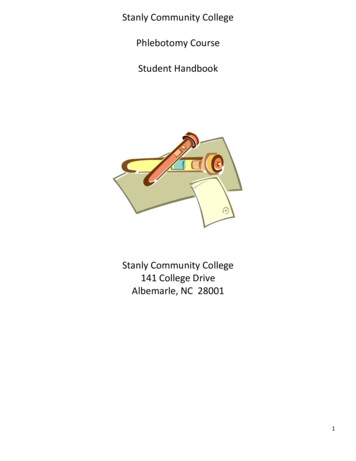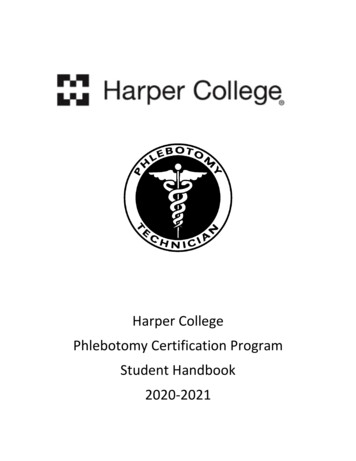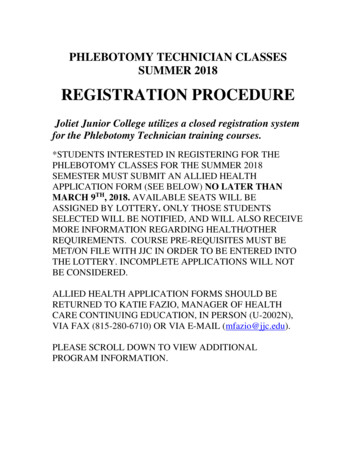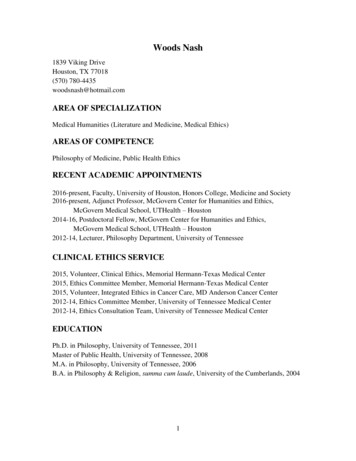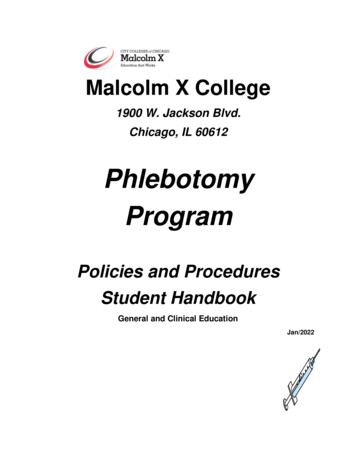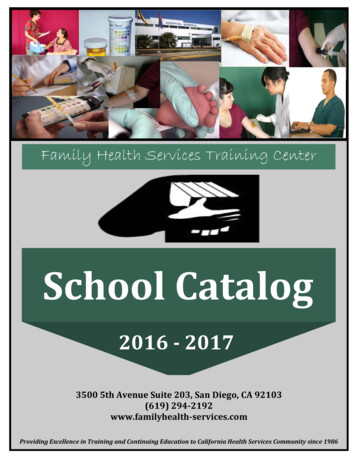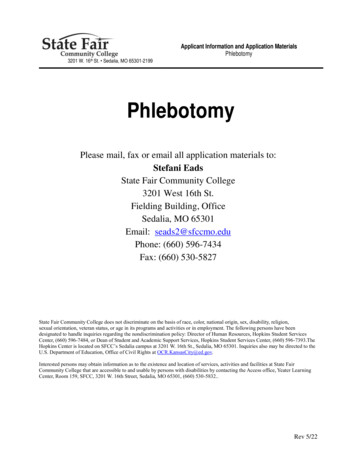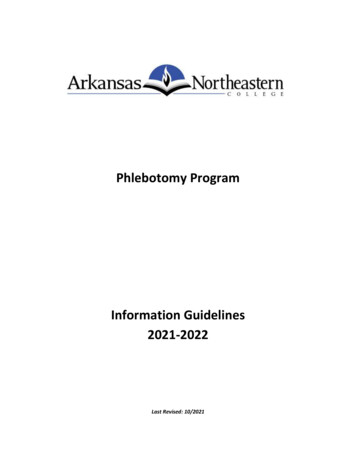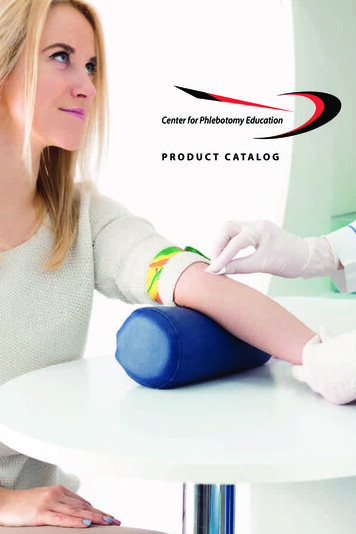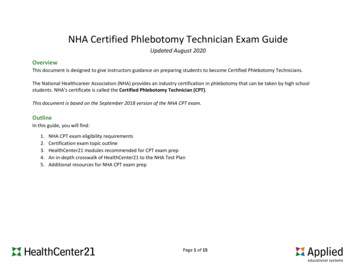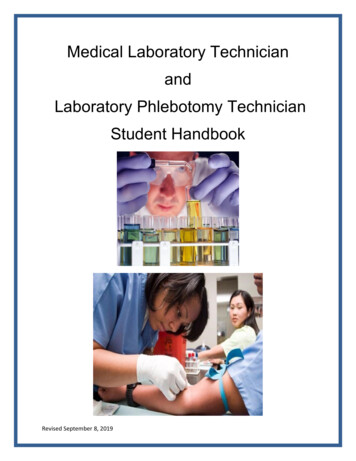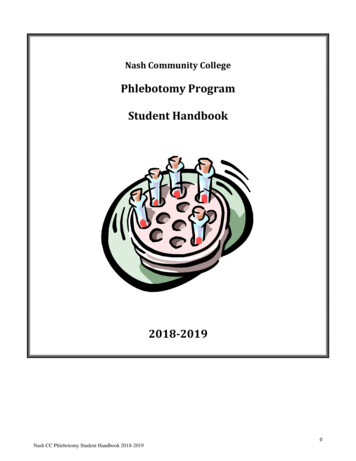
Transcription
Nash Community CollegePhlebotomy ProgramStudent Handbook2018-20190Nash CC Phlebotomy Student Handbook 2018-2019
PHLEBOTOMY PROGRAM2018-2019 STUDENT HANDBOOKTABLE OF CONTENTSWelcome . 3Program Contact Information . 3General Information. 5NCC Mission and Program Mission; Goal . 6Program Description . 7Criminal Background Checks/Drug Screens . 7Contracted Clinical Facilities . 8Essential Functions for Medical Assisting . 9Curriculum Sequence. 10Resources . 10Student Services . 10Program Costs/ Financial Aid . 11Academic Dishonesty . 12Student Conduct. 12Incomplete Grades . 13Withdrawal . 13Class Scheduling . 13Student Illness or Injury . 13Inclement Weather . 15Campus Safety. 15Visitors . 15Cell Phone Policy . 15Social Media Policy . 16Criminal Background Checks/Drug Screen Due Process. 16Due Process . 17Academic and Clinical Policies . 17Grading . 17Failure to Progress . 17Course Evaluations . 17Attendance Policy . 18Classroom Safety . 19Clinical Practicums . 20Clinical Placement Policy . 201Nash CC Phlebotomy Student Handbook 2018-2019
TABLE OF CONTENTS (cont’d)Student Appearance . 21Required Apparel . 22Commuting and Transportation . 22Telephone / Cell Phone Policy . 22Confidentiality and HIPAA. 22Clinical Probation . 23Dismissal: Non-Academic . 23Readmission . 23Student Service Work Policy . 24Certification Exam . 24NAACLS Entry-Level Phlebotomist Competencies . 25Information Release Consent Form . 29Criminal Background Check / Drug Screen Form . 31Liability Release Form . 33Student Handbook and Policy Agreement Form. 352Nash CC Phlebotomy Student Handbook 2018-2019
Nash Community College Phlebotomy ProgramStudent HandbookWelcome! You have made the choice of pursuing a certificate in Phlebotomy. If you have notattended Nash Community College before, welcome to this campus and to this program. Thisprogram has been designed by the Phlebotomy Advisory Committee and College faculty toenhance your ability to earn the credential of Phlebotomy Technician (ASCP) through successfulcertification testing, contribute as a vital team member of the health care community, and to attainpersonal satisfaction and growth in your chosen career.This Student Handbook is designed to be a reference for you throughout the program by providinginformation about the policies and expectations of the program. Please retain this Handbook in asecure place as you will need to refer to it from time to time during your program progression.Always feel free to come to the faculty with any additional questions you may have.Phlebotomy Technology Program Contact InformationNash Community College:Department Chair for Allied Health andProgram Director/ Faculty:Nancy Worsinger, MS, MT(ASCP), RMA252-451-8383Office B-2114ngworsinger102@nashcc.eduVice President of Instruction andChief Academic OfficerTammie Clark, DPT, PT252-451-8372Office 2154tclark@nashcc.eduHealth Sciences Admissions Coordinator Nicole LawrenceOffice n Organizations:NAACLSNational Accrediting Agency for ClinicalLaboratory Sciences5600 N. River RoadSuite 720Rosemont, IL 60018Phone: 773-714-8880www.naacls.org3Nash CC Phlebotomy Student Handbook 2018-2019
SACSSouthern Association of Colleges and SchoolsCommission on Colleges1866 Southern LaneDecatur, GA 30033-4097404-679-3558www.sacscoc.orgNationally Recognized Phlebotomy Certification AgenciesAmerican Certification AgencyCredential: CPT(ACA)P.O. Box 58Osceola, IN 46561www.acacert.com574-277-4538American Medical TechnologistsCredential: RPT(AMT)10700 W. Higgins RoadSuite 150Rosemont, IL 60018www.americanmedtech.org847-823-5169*American Society for Clinical PathologyBoard of CertificationCredential: PBT(ASCP)33 W Monroe, #1600Chicago, IL 60603www.ascp.org312-541-4999*Nash Community College phlebotomy students are required to register for the ASCPexam.National Center for Competency TestingCredential: NCPT7007 College Boulevard, Suite 705Overland Park, KS 66211www.ncctinc.com913-498-1000Nash Community College does not unlawfully discriminate in offering equal access to itseducational programs and activities or with respect to employment terms and conditions on thebasis of an individual’s race, color, national origin, sex, sexual orientation, gender, genderexpression, gender identity, genetic information, disability age, religion, or veteran status.- Nash Community College Catalog4Nash CC Phlebotomy Student Handbook 2018-2019
General InformationThe Phlebotomy ProfessionPhlebotomy professionals are qualified by academic and practical education to collect, transport,and process blood specimens for analysis. They select the appropriate equipment and techniquebased on a thorough understanding of the anatomy and physiology of the patient, as well as thepsycho‐social factors that may impact specimen collection. Phlebotomy professionals performvenipunctures and capillary (dermal) punctures adhering to all standards governing patient andemployee safety.The ability to relate to people, a capacity for calm and reasoned judgment, and a demonstration ofcommitment to the patient are essential qualities. Communication skills involve direct interactionwith the patient, family members of the patient, fellow members of the laboratory team, and othermembers of the healthcare team. Phlebotomy professionals demonstrate ethical and moralattitudes and principles that are necessary for gaining and maintaining the confidence of patients,professional associates, and the community.Upon graduation and initial employment, the phlebotomist will be able to demonstrate entry levelcompetencies in the above areas of professional practice. Refer to the NAACLS PhlebotomistCompetencies.Program InformationThe Nash Community College Phlebotomy program is a one-semester program that prepares thestudent for a career as a Phlebotomist through classroom, laboratory, and clinical education. TheNorth Carolina Community College System (NCCCS) and State Board of Education support the NCCPhlebotomy Program. The program of instruction is governed by regulations and requirementsof the NCCCS, the Institutional Policies of Nash Community College, and the National AccreditingAgency for Clinical Laboratory Sciences (NAACLS).The Nash Community College Phlebotomy Program has been continuously accredited by theNational Accrediting Agency for Clinical Laboratory Sciences (www.naacls.org) since 1989.Nash Community College is accredited by the Southern Association of Colleges and Schoolscommission on Colleges (SACS).Students entering the Phlebotomy profession should understand they are entering a professionthat operates according to established codes of conduct, both legal and ethical, and that byenrolling in this program you become bound by these guidelines. Our program is not an isolatedinstitution, but rather part of a nationwide network of healthcare that involves individualpractitioners and professional, institutional, state, and federal regulations.5Nash CC Phlebotomy Student Handbook 2018-2019
Nash Community College MissionNash Community College’s mission is to provide an educational environment that meets studentswhere they are and prepares them for successful college transfer and rewarding careers in aglobal and diverse society. Through quality instruction, support, services, technology, workforcedevelopment, research, and community partnerships, Nash Community College fosters lifelonglearning opportunities for individuals, communities, and organizations.Phlebotomy Program Mission StatementThe Nash Community College (NCC) Phlebotomy Program prepares individuals with theknowledge and skills necessary related to obtaining blood and other specimens for the purpose oflaboratory analysis. The NCC Phlebotomy Program mission is to provide education and trainingin the field of phlebotomy while maintaining high standards of instruction and service delivery.This is accomplished by providing theory and clinical experiences in a professional environmentthat is conducive to diverse learning needs of students.Phlebotomy Program GoalTo provide sound education resulting in:a) Competent graduates who could serve as quality employees for the health carecommunity and who have a working knowledge of phlebotomy and health care at the entrylevel;b) Graduates who have been adequately equipped with the knowledge that will allow themto successfully pass national certification exams; and,c) A workforce to meet the needs of a growing health care community.6Nash CC Phlebotomy Student Handbook 2018-2019
Program DescriptionThe Phlebotomy curriculum prepares individuals to obtain blood and other specimens for thepurpose of laboratory analysis. Course work includes proper specimen collection and handling,communication skills, and maintaining patient date. Graduates may qualify for employment inhospitals, clinics, physician’s offices, and other healthcare settings and are eligible to take thenational certification examination for phlebotomy technicians.The Curriculum Phlebotomy program is a certificate program that is completed in one semester.The program consists of an on-campus Phlebotomy Technology course, an off-site clinicalpracticum course, and one related general education course totaling 12 curriculum college credithours. The Continuing Education Phlebotomy program consists of the same on-campusPhlebotomy Technology and off-site clinical experience and leads to a Continuing EducationCertificate in Phlebotomy. The Curriculum and Continuing Education sections of the technologycourse are taught concurrently, with the same instructor, textbook, and course expectations. Allcourses are offered weekdays only. Course work includes proper specimen collection andhandling, communication skills, and legal issues related to health care.The Phlebotomy Technology theory course meets three mornings per week (M-W-F) during thefirst seven weeks of the semester and one morning a week (Fri) thereafter for the remaining nineweeks. The Phlebotomy Clinical Practicum begins on week eight and may follow a variety ofschedules, depending upon the clinical facilities the student is assigned to. This enables eachstudent to complete the majority of the theory and laboratory components of the program beforethe clinical component. The related general education course required for Curriculum studentsmay be taken online or in the evening.Criminal Background Checks and Drug ScreensCriminal background checks and drug screens are not required of admissions to the HealthSciences programs. However, students can expect to submit to criminal background checks (stateand/or federal) and drug screens in order to meet regulatory criteria of facilities participating inthe clinical education component of the Health Sciences program once admitted to the program.The Health Sciences faculty recognizes and is fully supportive of clinical facilities mandatingcriminal background checks and/or drug screens on students in the program.If a clinical facility prohibits a Health Sciences student from participating at the facility based onthe results of the criminal background check and/or drug screen, the student will be dismissedfrom the respective Health Sciences program for failure to progress. No alternative clinicalexperience will be arranged on behalf of the student, resulting in the inability of the student tomeet the curriculum requirements of the program. Students are encouraged to follow the dueprocess procedures for the respective Health Sciences program should they feel ineligibility wasdetermined as a result of false or inaccurate information.Students can expect to absorb all costs related to criminal background checks and/or drug screens.Specific procedures will be provided to students in the Phlebotomy program upon acceptance andenrollment.Students should also expect to submit to a criminal background check, at their own expense, whenseeking eligibility for national certification.7Nash CC Phlebotomy Student Handbook 2018-2019
Clinical Facilities Utilized for Clinical Rotation SchedulesEach Curriculum student will be scheduled for 144 hours of clinical practicum experience in atleast one of the clinical facilities contracted with the NCC Phlebotomy Program. Each ContinuingEducation student will be scheduled for 128 hours of clinical practicum experience. Every effortwill be made to schedule each student in one acute care facility and one ambulatory facility.Specific clinical rotation schedules are distributed to students well in advance of the start of theclinical experiences. Contracted clinical facilities are listed below.Ambulatory facilities:Hospitals:Boice Willis ClinicMain Laboratory901 N. Winstead Ave.Rocky Mount, NC 27804LifeCare Hospital1051 Noell DriveRocky Mount, NC 27804Clinical Liaison:Primary Care600 Nash Medical Arts Mall,Rocky Mount, NC 27804Clinical Liaison:Laboratory Manager, Kristen Harding252-937-0233Eastern NC Medical GroupMain Laboratory1041 Noell LaneRocky Mount, NC 27804Nashville Office155 Nashville Commons Dr,Nashville, NC 27856Clinical Liaison:Laboratory Manager, Agnes Lim252-451-2700Rocky Mount Family Medical Center804 English Rd.Rocky Mount, NC 27804Clinical Liaison:Laboratory Manager, Phyllis Wade252-443-3133 x226Angie Baker252-451-2492Nash Health Care Systems2460 Curtis Ellis DriveRocky Mount, NC 27804Clinical Liaison:Laboratory Manager, Rachel Sutton252-443-8590WakeMedLocations:3000 New Bern AvenueRaleigh, NC 27610Clinical Liaison:Phlebotomy Supervisor, Jerry Docking919-350-8242Cary Campus1900 Kildaire Farm Rd.Cary, NC, 27518Clinical Liaison:Laboratory Director, Cheshire Cole919-350-7181Wayne Memorial Hospital2700 Wayne Memorial Dr.Goldsboro, NC 27533Clinical Liaison:Phlebotomy Supervisor, Denise Green919-731-6577 / 919-731-60088Nash CC Phlebotomy Student Handbook 2018-2019
Essential Functions of the Phlebotomy StudentStudents enrolled in the Phlebotomy Program at Nash Community College must demonstratecompetence in various intellectual, physical, and social areas. The Americans with Disabilities Act(ADA) ensures qualified applicants to public institutions the ability to pursue program admissions,however, the applicant must meet essential requirements. All students admitted to thePhlebotomy Program will be held to the same standards with or without reasonableaccommodations. The following functions are considered essential requirements for admission,retention and graduation in Nash Community College’s Phlebotomy Program. The purpose of thesefunctions is to ensure Phlebotomy students provide safe, competent, and timely care to patientsrequiring phlebotomy procedures.Physical and Emotional Standards:Phlebotomy students should possess and be able to demonstrate the following:1. Interpersonal Skills – Interpersonal abilities sufficient to interact with individuals,families, and health care professionals from a variety of emotional, cultural and intellectualbackgrounds. For example, the phlebotomy student shall establish rapport withpatients/clients and the health care team members.2. Communication Skills – Communication abilities sufficient for interaction with others inverbal and written form. For example, explain venipuncture procedure to patient/client.3. Cognitive Abilities: - Ability to be oriented to time, place, and person; organizeresponsibilities, and make decisions. For example, recognize and report physicalproblems that occur when attempting venipuncture on a given patient/client.4. Mobility – Physical abilities sufficient to move from room to room and maneuver insmall spaces, stand and walk for extensive periods of time. For example, trips fromlaboratory to patients/clients rooms.5. Motor Skills – Gross and fine motor abilities sufficient to provide safe phlebotomyprocedures. For example, demonstrate proper needle insertion and withdrawal techniquewhen performing venipunctures.6. Hearing – Auditory ability sufficient to monitor health needs of patients/clients. Forexample, hear monitor alarms, emergency signals, patient/client requests.7. Visual – Visual ability sufficient to perform safe phlebotomy procedures and forobservation skills necessary in phlebotomist duties. For example: observe position ofneedle bevel; observe changes in specimen color.8. Tactile – Tactile ability sufficient for collecting specimens. For example: identify by touchpotential sites for venous and arterial punctures; distinguish between veins and othersubcutaneous structures.9Nash CC Phlebotomy Student Handbook 2018-2019
Phlebotomy C45600 (Curriculum)Curriculum SequenceFall / Spring (1 Semester)PBT 100PBT 101PSY 118/PSY 150Class503Phlebotomy TechnologyPhlebotomy PracticumInterpersonal or GeneralPsychologyLab200Clinical090Credit Hours63312Curriculum Total Credit HoursPhlebotomy (Continuing Education)Fall / Spring (1 Semester)MLA 3022Phlebotomy Experience240 Total Hours, classroom and clinicalResourcesThe Phlebotomy classroom and lab is room 2115 in Building B. This classroom contains medicalequipment and teaching aides used for learning during coursework in the program. Most of thisequipment is very expensive and some is dangerous if misused. Students are prohibited from usingequipment that has not been thoroughly explained during class or lab and should handle itcarefully to avoid damage. Students may use equipment only after a faculty member has observedthe student using the equipment safely and effectively.Please note that it is up to students and faculty to maintain the classrooms and equipment inproper order. Materials should never be removed from the classroom or lab area without specificpermission. Students will be asked to contribute to maintaining the appearance of the facilities.Phlebotomy faculty are available during scheduled office hours, which are posted outside theiroffices. Students may schedule appointments with faculty outside of their scheduled office hours.The College library has many texts related to medical and health care subjects, computerizedreference systems, and Internet access. Class materials may be left on reserve in the library. A copymachine is available for student use for a fee.Student ServicesThere are several resources on campus to assist students with tutorial, advising, career planning,and counseling services. Information regarding these services is included in the current coursesyllabus. Please make sure to contact your advisor or Student and Enrollment Services in a timelymanner if you feel you might benefit from any of their services. Student and Enrollment Servicesoffices are located in Building A (telephone: 252/451-8219).The Student Wellness Center provides free confidential mental health services from a duallylicensed clinical including treatment for Anxiety, Depression, PTSD, Autism Spectrum Disorder,10Nash CC Phlebotomy Student Handbook 2018-2019
Substance Use Disorder, Domestic Violence, Crisis Intervention and Safety Planning. We also offersupport for Recovery Maintenance, Grief, Veterans, and the LGBTQAI Community. The StudentWellness Center is located in building B, Room 2112, telephone: 252-451-8319 or email:rholmes@nashcc.edu.Single Stop services include free tax preparation; benefits screening and access to financial helpingresource at the national, state, and local level; financial counseling; and legal services. The SingleStop main office is located in building B, room 2111, telephone: 252-428-7334 or email:singlestop@nashcc.edu.Program Costs/Financial AidCurriculum tuition and activity fees are calculated per credit hour. The current curriculumtuition rate for in-state students is 76.00 per credit hour and 268.00 per credit hour for out-ofstate students. The current additional costs include an activity fee of 5.00 per credit hour (witha maximum of 35.00), a technology fee of 6.00 per credit hour (with a maximum of 48.00), aSuccess Fee of 3.00 per semester, a CAPS (College Access, Parking and Security) fee of 14.00per semester, and a Health Sciences Universal Fee of 10.00 per semester. These figures arebased on 2016-2017 tuition rates established by the NC General Assembly.Continuing Education tuition for this course for the Fall 2016 semester is 180.00, withadditional CAPS and insurance fee of 6.25, and the Health Sciences Universal Fee of 10.00.In addition, a 135 ASCP exam fee is collected along with the tuition and other fees prior to thestart of the program for both Curriculum and Continuing Education students. Registering for thenational certification exam given by the American Society of Clinical Pathologists is arequirement of the program.All students can expect to absorb all cost related to books and supplies as well as the cost ofcriminal background checks and drug screenings required in the Phlebotomy program. Costs oftransportation and meals associated with clinical educational experiences are also the student’sresponsibility. Please note this information is intended for estimated cost only and is subjectto change without notice.Note: Pell Grant awards cannot be used to pay for the cost of attendance for the Curriculum levelof this program.Nash Community College makes every effort to provide financial assistance, where need exists, forstudents whose primary goal is to acquire post-secondary education. The College Catalog detailsthe Financial Aid process and types of aid available (this can also be accessed online atwww.nashcc.edu). Financial Aid awards are based upon many considerations, but primarily ondemonstrated financial need of the applicant. Aid is available through several funding sources:loans, work-study employment, grants and scholarships, or a combination of these sources. Somestudents may receive veteran’s assistance for college. Please contact the Financial Aid Office(nccfinancialaid@nashcc.edu or veterans@nashcc.edu or call 252-428-7378) for more information.11Nash CC Phlebotomy Student Handbook 2018-2019
Department of Education regulations dictate to colleges what criteria must be met before financialaid awards from federal and state funds can be disbursed, including proper attendancedocumentation.Academic DishonestyNash Community College upholds the integrity of the academic process. Academic dishonestyundermines that integrity. Academic dishonesty includes cheating and plagiarism.Cheating is an attempt to use unethical or dishonest means to perform work for a course. Thesemay include, but are not limited to, copying the work of others, bringing unapproved sources ofinformation during tests or other work (“cheat sheets,” the use of information stored on electronicdevices, the use of others’ work on out of class assignments, etc.), and any other covert means tocomplete work without the approval of the instructor. Cheating encompasses both those givingand receiving aid.Plagiarism is the undocumented use of information or the work of others presented as one’s own.Nash Community College recognizes two types of plagiarism - accidental plagiarism and deliberateplagiarism.Accidental plagiarism occurs when a student attempts to cite their sources, but does so improperlyor incompletely. Nash Community College treats accidental plagiarism as poor work, and it will begraded as such.Deliberate plagiarism occurs when a student copies the work of others or purposefully usesinformation from sources with no attempt to document it and presents it as their own. NashCommunity College treats deliberate plagiarism as academic dishonesty.Academic dishonesty is dealt with as follows:1. For a first offense within a course, the student will receive a zero for the work in question.The student will be counseled by the instructor. An Academic Dishonesty Report form willbe forwarded to the Associate Vice President of Instruction and maintained on file.2. For a second offense within a course, the student will receive an F for the course. AnAcademic Dishonesty Report form will be forwarded to the Associate Vice President ofInstruction and maintained on file.3. Repeated offenses may lead to the recommendation of additional actions and penalties,including suspension or expulsion from the College in accordance with the StudentDismissal, Suspension, or Expulsion Authority procedure.4. Additional information is presented in the Nash Community College Academic Catalog.Student ConductStudents at Nash Community College are expected to conduct themselves as responsible adults inaccordance with generally accepted standards of morality and decency at all times. The ConductCode is printed in the NCC catalog and the NCC Student Calendar. A violation of any of the listedbehaviors will warrant immediate disciplinary action and may
The Nash Community College (NCC) Phlebotomy Program prepares individuals with the knowledge and skills necessary related to obtaining blood and other specimens for the purpose of laboratory analysis. The NCC Phlebotomy Program mission is to provide education and training in the field of phlebotomy while maintaining high standards of instruction .
